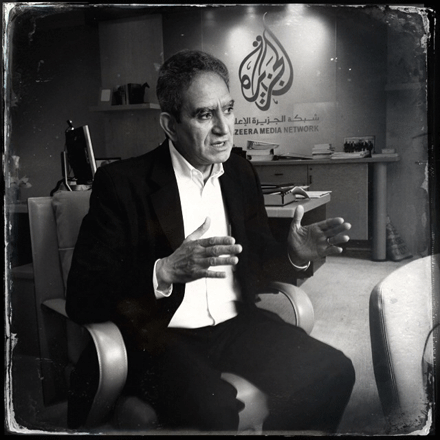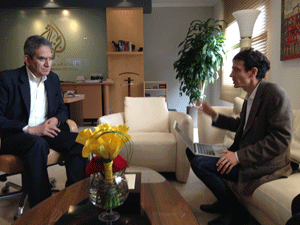Interview: Peter Hossli Photos: Katarina Premfors

Mostefa Souag: From the beginning it was very positively received in the Arab world. But the governments were very suspicious; they considered Al Jazeera a threat. Television used to be in the service of the rulers, it was more or less a mouthpiece for propaganda; freedom was very limited. Al Jazeera was free and independent. Other Arab media organizations have been looking up to us. We showed them what journalism could be.
How has this affected Al Jazeera itself?
We’ve grown, we have more influence and more viewers. We’ve succeeded because we’re free and independent, we’re in the business of news, not money. Some Arab networks had more money than we have. They’re gone. We owe our success to the quality of the journalists.
More than 400 journalists from over 60 countries are now working for Al Jazeera around the globe. What kinds of people do you look for?
Genuine and passionate media people. We pay them good salaries, sometimes even better than our competitors’. We provide them with the space they need to practice their profession.
Journalists need to be independent. In the West Al Jazeera is regarded as the mouthpiece of Arab propaganda.
We’re criticized because we show all sides to a story. In Iraq our reporters were not merely embedded with the Americans. We also showed how their wonderful technology missed Saddam Hussein and killed civilians. CNN and others would have loved that material, but they were not there. Our office in Afghanistan was bombed, and our reporter in Iraq was killed – because we were reporting live from there.
To what extent does the owner of Al Jazeera, the Emir of Qatar, get involved?
Al Jazeera is owned by the state of Qatar, not by a person. Nobody tells us what to report. Journalistically, Al Jazeera is completely independent.
Surely the Emir is not entirely selfless. He is paying the bills. You don’t have to turn a profit.
Every government tries to gain influence, gain power. If you try to gain power with hard power, arms etc., you end up killing people. Or you can choose soft power, media or diplomacy. That doesn’t kill anyone. Doha is the capital of peace negotiations. The Soccer World Cup in 2022 is important. The Emir wants to develop the country and at the same time to contribute to humanity.

Al Jazeera has no doubt been the most successful Arab project in the last twenty years. In the Arab countries it is the channel that has contributed most to making people aware of their reality. If you want to know what’s going on in terms of youth, women’s roles, politics or economics, watch Al Jazeera. The Arab spring originated with the people, but Al Jazeera was there to cover it accurately. We showed how you can obtain justice if you fight for it.
What distinguishes Al Jazeera from other global news networks like the BBC or CNN?
We report on Obama and Merkel, what they’re doing in their countries, but we also show people who are usually ignored. We give a voice to the voiceless.
Why does Al Jazeera hardly ever report on Qatar?
There is not much happening here that the world cares about. We don’t want to create a story that is not there. We’re not a local TV station – we’re global. When Amnesty International presented a report [in November on the abuse of worker’s rights] we were there.